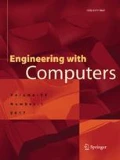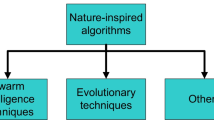Abstract
This study proposes an adaptive multi-team perturbation-guiding Jaya (AMTPG-Jaya) algorithm which uses multiple teams to explore the search space. The proposed algorithm adapts the number of teams to explore the search space based on the convergence to the optimum. Furthermore, each team uses the same set of the population, and there is a different perturbation or movement equation for each team. As each team has a different perturbation scheme, the set of the moves to new positions by each team is unique. The moving equation of the worst performing team will be updated by the superiority of solutions produced by each team. The superiority of the solutions for each team is calculated based on the fitness value and boundary violations of solutions. The proposed algorithm is examined using computationally expensive constrained optimization problems taken from the CEC-2017 technical report. Computational test results have demonstrated the effectiveness of the AMTPG-Jaya algorithm when compared to the other well-known approaches. Also, a multi-objective optimization is carried out on a solar dish Stirling engine system to find the optimal thermo-economic parameters to maximize dimensionless power and thermal efficiency. The computational results revealed that the AMTPG-Jaya algorithm results are superior to those achieved by the other algorithms presented in this work.










Similar content being viewed by others
References
Rao RV (2016) Review of applications of TLBO algorithm and a tutorial for beginners to solve the unconstrained and constrained optimization problems. Decis Sci Lett 5:1–30
Li Y, Zeng X (2010) Multi-population co-genetic algorithm with double chain-like agents structure for parallel global numerical optimization. Appl Intell 32(3):292–310
Toledo CFM, De Oliveira RRR, Morelato França P (2013) A hybrid multi-population genetic algorithm applied to solve the multi-level capacitated lot sizing problem with backlogging. Comput Oper Res 40(4):910–919
Biswas S, Kundu S, Bose S, Das S, Suganthan PN, Panigrahi BK (2013) Migrating forager population in a multi-population Artificial Bee Colony algorithm with modified perturbation schemes. In: proc 2013 IEEE Symp Swarm Intell SIS 2013–2013 IEEE Symp Ser Comput Intell SSCI 2013. 248–255
Raeesi MRN, Kobti Z (2013) Heterogeneous multi-population cultural algorithm. In: Proc of IEEE Congr Evol Comput (CEC), Cancun, Mexico, Jun. 2013, 292–299
Lin WY, Hong TP, Liu SM, Lin JH (2012) Revisiting the design of adaptive migration schemes for multipopulation genetic algorithms. In: proc—2012 Conf Technol Appl Artif Intell TAAI 2012 338–343
Hong TP, Chen JC, Lin WY, Chen CH (2015) Analysis of parallel sub-swarm PSO with the same total particle numbers. In: Proc—2015 18th Int Conf Network-Based Inf Syst NBiS 2015, 616–619
Xiao J, Li W, Liu B, Ni P (2016) A novel multi-population coevolution immune optimization algorithm. Soft Comput Springer Berlin Heidelberg 20(9):3657–3671
Chatterjee I, Zhou M (2017) Differential Evolution Algorithms under Multi-population Strategy. In: Proc Wirel Optical Commun Conference, Newark, 1–8
Xia L, Chu J, Geng Z (2014) A multiswarm competitive particle swarm algorithm for optimization control of an ethylene cracking furnace. Appl Artif Intell 28(1):30–46
Zhao X, Liu Z, Yang X (2014) A multi-swarm cooperative multistage perturbation guiding particle swarm optimizer. Appl Soft Comput 22:77–93
Wang X, Tang L (2016) An adaptive multi-population differential evolution algorithm for continuous multi-objective optimization. Inf Sci 348:124–141
Nseef SK, Abdullah S, Turky A, Kendall G (2016) An adaptive multi-population artificial bee colony algorithm for dynamic optimisation problems. Knowl Based Syst 104:14–23
Biswas S, Das S, Debchoudhury S, Kundu S (2014) Co-evolving bee colonies by forager migration: a multi-swarm based Artificial Bee Colony algorithm for global search space. Appl Math Comput 232:216–234
Wang G, Chang B, Zhang Z (2015) A Multi-Swarm Bat Algorithm for Global Optimization. In: Proc IEEE Congr Evol Comput, Sendai, Japan, May 2015, 480–485
Wu G, Mallipeddi R, Suganthan PN, Wang R, Chen H (2016) Differential evolution with multi-population based ensemble of mutation strategies. Inf Sci 329:329–345
Ali MZ, Awad NH, Suganthan PN, Reynolds RG (2017) An adaptive multipopulation differential evolution with dynamic population reduction. IEEE Trans Cybern 47(9):2768–2779
Rao RV (2016) Jaya: a simple and new optimization algorithm for solving constrained and unconstrained optimization problems. Int J Ind Eng Comput 7(1):19–34
Warid W, Hizam H, Mariun N, Abdul-Wahab NI (2016) Optimal power flow using the Jaya algorithm. Energies 9(9):678
Zhang Y, Yang X, Cattani C, Rao RV, Wang S, Phillips P (2016) Tea category identification using a novel fractional fourier entropy and Jaya algorithm. Entropy 18(3):77
Rao RV, More KC, Taler J, Ocłoń P (2016) Dimensional optimization of a micro-channel heat sink using Jaya algorithm. Appl Therm Eng 103:572–582
Michailidis PD (2017) An efficient multi-core implementation of the Jaya optimisation algorithm. Int J Parallel Emergent Distrib Syst. https://doi.org/10.1080/17445760.2017.1416387
Wang S, Rao RV, Chen P, Zhang Y, Liu A, Wei L (2017) Abnormal breast detection in mammogram images by feed-forward neural network trained by Jaya algorithm. Fundamenta Informaticae 151(1–4):191–211
Rao RV, Saroj A (2017) Economic optimization of shell-and-tube heat exchanger using Jaya algorithm with maintenance consideration. Appl Therm Eng 116:473–487
Rao RV, Saroj A, Ocloń P, Taler J, Taler D (2017) Single- and multi-objective design optimization of plate-fin heat exchangers using Jaya algorithm. Heat Transf Eng 39(13–14):1–16
Du D-C, Vinh H-H, Trung V-D, Quyen N-TH, Trung N-T (2018) Efficiency of Jaya algorithm for solving the optimization-based structural damage identification problem based on a hybrid objective function. Eng Optim 50(8):1233–1251
Rao RV (2019) Jaya: an advanced optimization algorithm and its engineering applications, Springer, Cham. https://doi.org/10.1007/978-3-319-78922-4
Rao RV, More KC (2017) Design optimization and analysis of selected thermal devices using self-adaptive Jaya algorithm. Energy Convers Manag 140:24–35
Rao RV, More KC (2017) Optimal design and analysis of mechanical draft cooling tower using improved Jaya algorithm. Int J Refrig 82:312–324
Rao RV, Saroj A (2016) A self-adaptive multi-population based Jaya algorithm for engineering optimization. Swarm Evol Comput 37:1–26
Rao RV, Saroj A (2017) Constrained economic optimization of shell-and-tube heat exchangers using elitist-Jaya algorithm. Energy 128:785–800
Rao RV, Rai DP (2017) Optimization of welding processes using quasi-oppositional-based Jaya algorithm. J Exp Theor Artif Intell 29(5):1099–1117
Yu K, Liang JJ, Qu BY, Chen X, Wang H (2017) Parameters identification of photovoltaic models using an improved JAYA optimization algorithm. Energy Convers Manag 150:742–753
Gao K, Zhang Y, Sadollah A, Lentzakis A, Su R (2017) Jaya, harmony search and water cycle algorithms for solving large-scale real-life urban traffic light scheduling problem. Swarm Evol Comput 37:58–72
Farah A, Belazi A (2018) A novel chaotic Jaya algorithm for unconstrained numerical optimization. Nonlinear Dyn 93(3):1451–1480
Ocłoń P, Cisek P, Rerak M, Taler D, Rao RV, Vallati A, Pilarczyk M (2018) Thermal performance optimization of the underground power cable system by using a modified Jaya algorithm. Int J Therm Sci 123:162–180
Wang L, Zhang Z, Huang C, Tsui KL (2018) A GPU-accelerated parallel Jaya algorithm for efficiently estimating Li-ion battery model parameters. Appl Soft Comput 65:12–20
Huang C, Wang L, Yeung RSC, Zhang Z, Chung HSH, Bensoussan A (2018) A prediction model-guided Jaya algorithm for the PV system maximum power point tracking. IEEE Trans Sustain Energy 9(1):45–55
Rao RV, Keesari HS (2018) Multi-team perturbation guiding Jaya algorithm for optimization of wind farm layout. Appl Soft Comput 71:800–815
Wu G, Mallipeddi R, Suganthan PN (2016) Problem definitions and evaluation criteria for the CEC 2017 competition on constrained real-parameter optimization. Technical Report, Nanyang Technological University Singapore, September 2017, NTU web. http://www.ntu.edu.sg/home/EPNSugan/index_files/CEC2017/CEC2017.htm. Accessed 01 May 2018
Zamuda A (2017) Adaptive constraint handling and success history differential evolution for CEC 2017 constrained real-parameter optimization. In: 2017 IEEE Congress on Evolutionary Computation (CEC), San Sebastian, pp 2443–2450. https://doi.org/10.1109/CEC.2017.7969601
Tvrdík J, Poláková R (2017) A simple framework for constrained problems with application of L-SHADE44 and IDE. In: 2017 IEEE Congress on Evolutionary Computation (CEC), San Sebastian, pp 1436–1443. https://doi.org/10.1109/CEC.2017.7969472
Polakova R (2017) L-SHADE with competing strategies applied to constrained optimization. In: 2017 IEEE Congress on Evolutionary Computation (CEC), San Sebastian, 2017, pp 1683–1689. https://doi.org/10.1109/CEC.2017.7969504
Trivedi A, Sanyal K, Verma P, Srinivasan D (2017) A unified differential evolution algorithm for constrained optimization problems. In: 2017 IEEE Congress on Evolutionary Computation (CEC), San Sebastian, 2017, pp 1231–1238. https://doi.org/10.1109/CEC.2017.7969446
Deb K (2000) An efficient constraint handling method for genetic algorithms. Comput Methods Appl Mech Eng 186(2–4):311–338
Derrac J, García S, Molina D, Herrera F (2011) A practical tutorial on the use of nonparametric statistical tests as a methodology for comparing evolutionary and swarm intelligence algorithms. Swarm Evol Comput 1(1):3–18
Ahmadi MH, Sayyaadi H, Mohammadi AH, Barranco-Jimenez MA (2013) Thermo-economic multi-objective optimization of solar dish-Stirling engine by implementing evolutionary algorithm. Energy Convers Manag 73:370–380
Yaqi L, Yaling H, Weiwei W (2011) Optimization of solar-powered Stirling heat engine with finite-time thermodynamics. Renew Energy 36(1):421–427
Ahmadi MH, Sayyaadi MH, Dehghani S, Hosseinzade H (2013) Designing a solar powered Stirling heat engine based on multiple criteria: Maximized thermal efficiency and power. Energy Convers Manag 75:282–291
Ahmadi MH, Dehghani S, Mohammadi AH, Feidt M, Barranco-Jimenez MA (2013) Optimal design of a solar driven heat engine based on thermal and thermo-economic criteria. Energy Convers Manag 75:635–642
Ferreira AC, Teixeira S, Teixeira JC, Martins LB (2015) Design optimization of a solar dish collector for its application with stirling engines. In: ASME international mechanical engineering congress and exposition, vol 6A: Energy. ASME, p V06AT07A033. https://doi.org/10.1115/IMECE2015-52241
Punnathanam V, Kotecha P (2016) Effective multi-objective optimization of Stirling engine systems. Appl Therm Eng 108:261–276
Carrillo Caballero GE, Mendoza LS, Martinez AM, Silva EE, Melian VR, Venturini OJ, Del Olmo OA (2017) Optimization of a Dish Stirling system working with DIR-type receiver using multi-objective techniques. Appl Energy 204:271–286
Glynn John S, Lakshmanan T (2017) Cost optimization of dish solar concentrators for improved scalability decisions. Renew Energy 114:600–613
Barreto G, Canhoto P (2017) Modelling of a Stirling engine with parabolic dish for thermal to electric conversion of solar energy. Energy Convers Manag 132:119–135
Stefanovic VP, Pavlovic SR, Bellos E, Tzivanidis C (2018) A detailed parametric analysis of a solar dish collector. Sustain Energy Technol Assess 25:99–110
Author information
Authors and Affiliations
Corresponding author
Additional information
Publisher’s Note
Springer Nature remains neutral with regard to jurisdictional claims in published maps and institutional affiliations.
Rights and permissions
About this article
Cite this article
Rao, R.V., Keesari, H.S., Oclon, P. et al. An adaptive multi-team perturbation-guiding Jaya algorithm for optimization and its applications. Engineering with Computers 36, 391–419 (2020). https://doi.org/10.1007/s00366-019-00706-3
Received:
Accepted:
Published:
Issue Date:
DOI: https://doi.org/10.1007/s00366-019-00706-3




